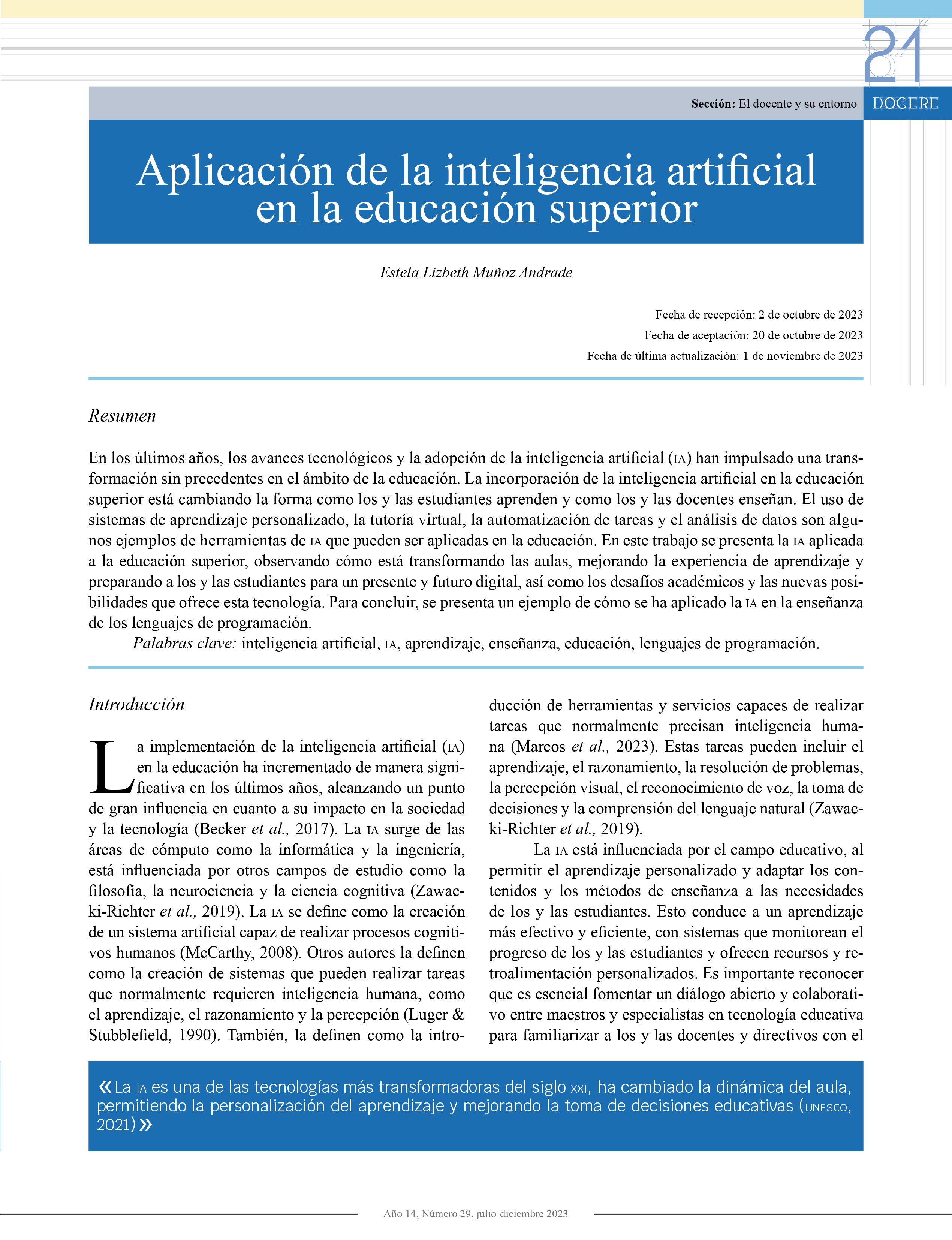Application of Artificial Intelligence in Higher Education
DOI:
https://doi.org/10.33064/2023docere295075Keywords:
artificial intelligence, AI, learning, teaching, education, programming languagesAbstract
In recent years, technological advancements and the adoption of artificial intelligence (AI) have driven an unprecedented transformation in the field of education. The incorporation of AI in higher education is changing how students learn and how teachers teach. The use of personalized learning systems, virtual tutoring, task automation, and data analysis are some examples of AI tools that can be applied in education. This paper presents AI applied to higher education, examining how it is transforming classrooms, enhancing the learning experience, and preparing students for a digital present and future, as well as the academic challenges and new possibilities that this technology offers. To conclude, an example of how AI has been applied in the teaching of programming languages is presented.
Translated by Alexia Carolina Cruz Rodríguez.
Downloads
References
Arévalo-Mercado, C. A., Estrada-Rentería, B. G. & Muñoz-Andrade, E. L. (2019). El efecto de la teoría de carga cognitiva en el aprendizaje de la programación básica. Entorno, (67), 169-176. https://doi.org/https://doi.org/10.5377/entorno.v0i67.7500
Becker, S. A., Cummins, M., Davis, A., Freeman, A., Hall, C. G. & Ananthanarayanan, V. (2017). NMC horizon report: 2017 higher education edition. The New Media Consortium.
Bozkurt, A., Xiao, J., Lambert, S., Pazurek A.,… (2023). Speculative futures on Chatgpt and generative artificial intelligence (AI): A collective reflection from the educational landscape. Asian Journal of Distance Education, 18(1).
Chassignol, M., Khoroshavin, A., Klimova, A. & Bilyatdinova, A. (2018). Artificial Intelligence trends in education: A narrative overview. Procedia Computer Science, 136, 16-24. https://doi.org/10.1016/j.procs.2018.08.233
Compañ-Rosique, P., Satorre-Cuerda, R., Llorens-Largo, F. & Molina-Carmona, R. (2015). Enseñando a programar: un camino directo para desarrollar el pensamiento computacional. Revista de Educación a Distancia (red), (46), 1-15. https://doi.org/10.6018/red/46/11
Giró Gràcia, X. & Sancho Gil, J. M. (2023). La Inteligencia Artificial en la educación: Big data, cajas negras y solucionismo tecnológico. Revista Electrónica Transformar, 4(1), 34.
González-González, C. S. (2023, abril). El impacto de la inteligencia artificial en la educación: transformación de la forma de enseñar y de aprender. Revista Qurriculum, 1(36), 51-60. https://doi.org/https://doi.org/10.25145/j.qurricul.2023.36.03
Luger, G. F. & Stubblefield, W. A. (1990). Artificial intelligence and the design of expert systems. Benjamin-Cummings Publishing Co., Inc.
Marcos, M., Álvarez A., Aguado, A., Paz, D., Saldaña, J. & Carrillo, J. (2023). Inteligencia Artificial en la educación digital y los resultados de la valoración del aprendizaje. Lima, Perú: Editorial Mar Caribe de Josefrank Pernalete Lugo. https://osf.io/preprints/osf/c3pmd
McCarthy, J. (2008). Teoría de la inteligencia artificial para la calidad. Historia, 10, 2015.
Ocaña-Fernández, Y., Valenzuela-Fernández, L. A. & Garro-Aburto, L. L. (2019). Artificial intelligence and its implications in higher education. Purposes and Representations, 7(2), 536-552.
Tuomi, I. (2019). Informe Resumen: el impacto de la Inteligencia Artificial en el aprendizaje, la enseñanza y la educación. Intef, 1(noviembre), 47. https://doi.org/10.2760/12297
UNESCO. (2021). La Inteligencia Artificial en la educación. https://es.unesco.org/themes/tic-educacion/inteligencia-artificial
Vera, F. (2023). Integración de la Inteligencia Artificial en la educación superior: desafíos y oportunidades. Transformar, 4(1), 17-34.
Zawacki-Richter, O., Marín, V. I., Bond, M. & Gouverneur, F. (2019). Systematic review of research on artificial intelligence applications in higher education–Where are the educators? International Journal of Educational Technology in Higher Education, 16(1). https://doi.org/10.1186/s41239-019-0171-0
Zhang, D., Mishra, S., Brynjolfsson, E.,... (2021). Informe 2021. Artificial Intelligence Index. Instituto de Inteligencia Artificial Centrada en Humanos (HAI) de la Universidad de Stanford. https://aiindex.stanford.edu/wp-content/uploads/2021/05/2021-AI-Index-Report_Spanish-Edition.pdf

Downloads
Published
How to Cite
Issue
Section
License
Esta obra está bajo una Licencia Creative Commons Atribución-NoComercial-CompartirIgual 4.0 Internacional.
El lector y/o usuario que utilice el material publicado en la revista DOCERE de la Universidad Autónoma de Aguascalientes, deberá en todos los casos: a) Reconocer la autoría del material utilizado, proporcionando un enlace a la licencia, además de indicar sí se han realizado cambios al material; b) Queda prohibido utilizar el material proveniente de la revista DOCERE, con finalidad comercial y, C) En los casos en los que se realice la remezcla, transformación o creación, a partir del material publicado de la revista DOCERE, se deberá dar reconocimiento de los derechos que correspondan a la Universidad Autónoma de Aguascalientes, en su carácter de titular de la materia protegible utilizada. En caso de infracción a lo antes dispuesto, el lector y/o usuario, se hará acreedor a las sanciones que establece la legislación de la materia.












